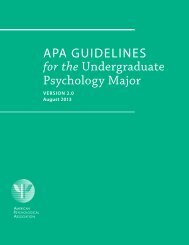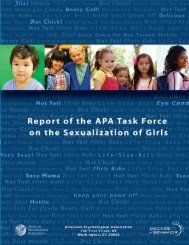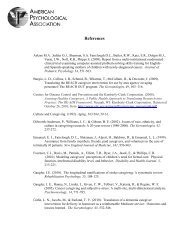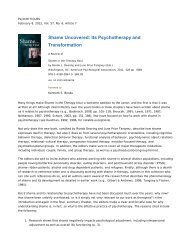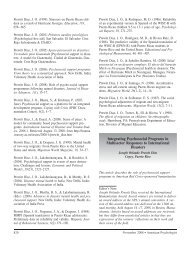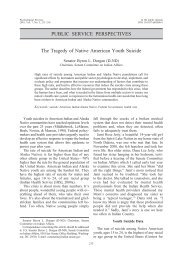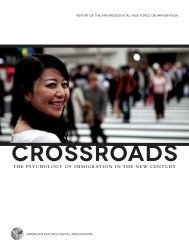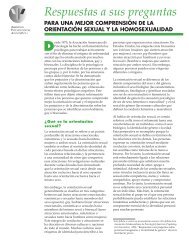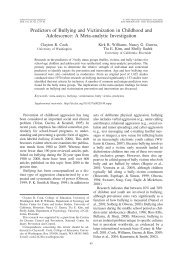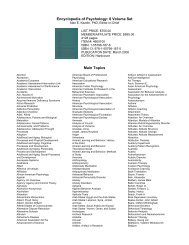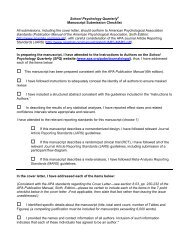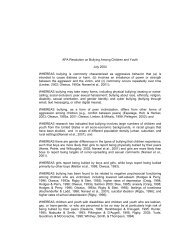James McKeen Cattell, Nicholas Murray Butler, and Academic ...
James McKeen Cattell, Nicholas Murray Butler, and Academic ...
James McKeen Cattell, Nicholas Murray Butler, and Academic ...
You also want an ePaper? Increase the reach of your titles
YUMPU automatically turns print PDFs into web optimized ePapers that Google loves.
110 SOKAL<br />
fly leaf, “The American Association of University Professors versus Mr. <strong>Cattell</strong>”<br />
that, among other things, attacked the AAUP for not “tak[ing] special interest in<br />
me” <strong>and</strong> for not “offer[ing] to pay the cost of my law suits <strong>and</strong> to have assisted<br />
me in every possible way.” 226 He never published it, however, <strong>and</strong> he soon<br />
focused his energies on his br<strong>and</strong>-new Psychological Corporation.<br />
Conclusions<br />
Anyone looking for a hero in this episode in the history of American academia<br />
would be hard pressed to find one, as even those who praise Seligman for his role<br />
in creating the AAUPs Declaration must contend with his apparent “duplicit[y]”<br />
<strong>and</strong> “perfidy” in his relations with <strong>Cattell</strong>. <strong>Cattell</strong>’s own actions certainly do not<br />
inspire admiration, since (as this article has shown) they actually undermined his<br />
colleagues’ academic freedom. And this account certainly reinforces the unflattering<br />
portrait of <strong>Butler</strong> that led others to think of him as the dot on the letter I.<br />
Perhaps the most straightforward conclusion available is that personal “eccentricities”—to<br />
use the word that John Dewey used in defending <strong>Cattell</strong> before the other<br />
members of the Committee of Nine—<strong>and</strong> other aspects of individual personalities<br />
are among the most significant contingencies that help shape the flow of events<br />
that attract historical attention. This conclusion is certainly one that most biographers<br />
would readily accept.<br />
Indeed, of all those appearing in this narrative, John Dewey, perhaps, comes<br />
out the looking the best. To be sure, his support of American entry into World<br />
War I has been denounced by critics of the “Warfare State.” 227 But Dewey’s<br />
actions throughout this episode reflect both an admirably consistent personal<br />
loyalty to an old friend <strong>and</strong> strong support for academic freedom as it was<br />
understood in the late 1910s. That is, in May 1917, Dewey came to the defense<br />
of <strong>Cattell</strong> <strong>and</strong> asked his other colleagues if “scholars should be retired because of<br />
eccentricities.” His point, of course, was that to dismiss <strong>Cattell</strong> simply on account<br />
of his idiosyncrasies would be personally unfair to him <strong>and</strong>, more generally,<br />
would diminish academic freedom at Columbia. However, despite this st<strong>and</strong>, only<br />
one month later he concluded that he had to join the rest of the Committee of Nine<br />
to agree that “<strong>Cattell</strong>’s usefulness to the University is ended.” In doing so, he did<br />
not support the trustees’ plans for summary dismissal; indeed, by quitting the<br />
committee when <strong>Butler</strong> asked for Dana’s resignation he emphasized just how<br />
seriously he disparaged them. Instead, his actions demonstrate his belief that<br />
<strong>Cattell</strong>’s behavior represented much more than simple eccentricity or idiosyncrasy.<br />
In his view, then, this behavior sharply undermined academic freedom at<br />
Columbia, <strong>and</strong> Dewey simply could not tolerate such sabotage. Indeed, that<br />
Dewey’s actions support this article’s historical thesis is, perhaps, the strongest<br />
evidence of its value.<br />
In addition, it is worth emphasizing that this article argues its thesis through<br />
the relentless accumulation <strong>and</strong> presentation of details; that is, through the “thick<br />
description” of “the fine texture of the past” noted earlier. Such an approach is<br />
especially appropriate in writing about <strong>Cattell</strong>. After all, it was the continual<br />
accretion of <strong>Cattell</strong>’s nastiness <strong>and</strong> personal attacks that diminished the cause of<br />
academic freedom at Columbia <strong>and</strong> finally drove the trustees to act as they did.



